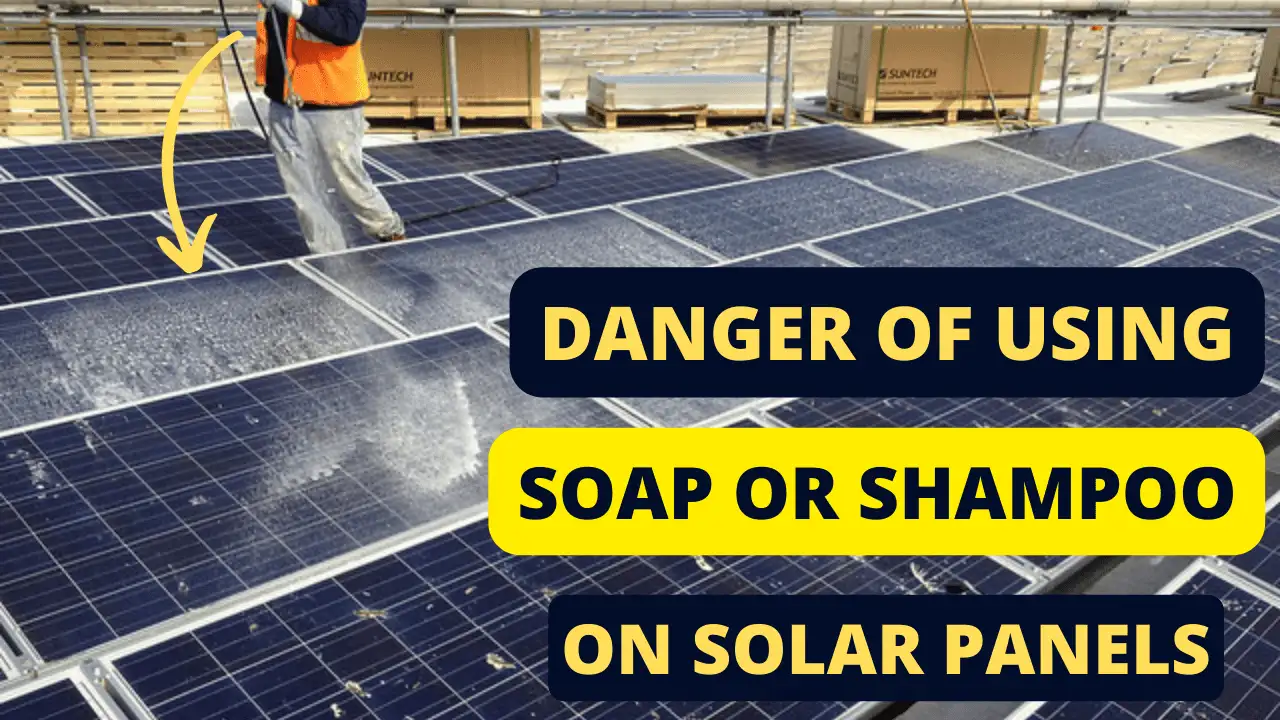Solar panels are a valuable investment for homeowners and businesses looking to reduce their carbon footprint and save money on their utility bills. However, over time, these panels can become dirty and covered with debris, which can affect their performance and efficiency. When it comes to cleaning solar panels, it’s important to use the correct method and avoid common mistakes. This article examines the best ways to clean solar panels and Why Soap Can Cause Damage to Your Solar Panel.
Why Soap Can Cause Damage to Your Solar Panel
One thing we’ve all learned during the coronavirus pandemic is that soap and water are effective in killing germs and keeping us safe. But when it comes to cleaning solar panels, soap alone isn’t the solution. Soap is great for cleaning your hands, but it can actually damage solar panels and reduce their efficiency.
A common misconception is that soap helps clean solar panels effectively. This belief stems from the idea that soap can break down oils or grease and remove stubborn stains. However, using soap on solar panels leaves a residue that can affect the panel’s ability to absorb sunlight. Additionally, certain chemicals in soap can react with the materials used in solar panels and cause damage over time.
The Risks of Using Soap on Solar Panels
Using soap on solar panels can lead to a variety of problems. Firstly, the residue left behind by soap can create a film on the surface of the panels, reducing their ability to absorb sunlight. This film can also attract dirt and dust, further diminishing the panels’ performance.
Furthermore, some types of soap contain ingredients that can corrode or degrade the materials used in solar panels. For example, certain detergents may contain acidic or alkaline substances that can damage the protective coating on the panels or cause discoloration. Over time, this can lead to reduced efficiency and even permanent damage to the panels.
The Best Methods for Cleaning Solar Panels
So, if soap is not the answer, what is the best way to clean solar panels? The most effective and safest method is to use plain water and a soft brush or sponge. By rinsing the panels with water and gently scrubbing away any dirt or debris, you can keep your solar panels clean without risking damage.
Before starting the cleaning process, it is important to ensure the panels are cool to the touch. Cleaning hot panels can cause the water to evaporate quickly, leaving behind streaks and spots. Additionally, avoid cleaning the panels during peak sunlight hours to minimize the risk of water droplets causing damage or leaving residue.
Proper Cleaning Techniques
When cleaning solar panels, it is essential to follow proper techniques to avoid causing any harm. Here are some important tips to keep in mind:
- Start by removing any loose dirt or debris with a soft brush or cloth. Gently sweep away any leaves, twigs, or dust that may have accumulated on the surface of the panels.
- Fill a bucket or spray bottle with clean, lukewarm water. Avoid using hot or cold water, as extreme temperatures can potentially damage the panels.
- Wet a soft brush or sponge with the water and gently scrub the surface of the panels. Use light pressure and circular motions to remove any stubborn dirt or stains. Avoid using abrasive materials or brushes with stiff bristles, as they can scratch the panels.
- Rinse the panels thoroughly with clean water to remove any remaining dirt or residue. Use a hose or a bucket of water to ensure all the soap and debris are washed away.
- Allow the panels to air dry or use a soft, lint-free cloth to gently pat them dry. Avoid using paper towels or abrasive cloths, as they can leave behind lint or scratch the surface of the panels.
Frequency of Cleaning
The frequency of cleaning your solar panels depends on various factors, such as the local climate and the amount of dust and debris in the area. In general, it is recommended to clean solar panels at least once or twice a week. However, if you live in an area with heavy pollution or frequent dust storms, more frequent cleaning may be necessary.
Additional Tips for Maintaining Solar Panels
Proper cleaning is just one aspect of maintaining the performance and longevity of your solar panels. Here are some additional tips to ensure they continue to operate at their best:
- Trim any nearby trees or shrubs that may cast shadows on your panels. Shading can significantly impact the panels’ ability to generate electricity.
- Regularly inspect the panels for any signs of damage or wear. Cracks, discoloration, or loose connections should be addressed promptly to prevent further issues.
- Keep an eye on the surrounding area for any potential sources of debris or shading. For example, if you notice a nearby construction site or a tree that is growing taller, take appropriate measures to protect your panels.
- Consider investing in a solar panel cleaning service if you are unable to clean the panels yourself. Professional cleaners have the knowledge and equipment to safely and effectively clean solar panels without causing damage.
Conclusion
Cleaning solar panels is an essential part of their maintenance and can significantly impact their performance and efficiency. While soap and water may be effective for handwashing, they should be avoided when it comes to cleaning solar panels. Instead, opt for plain water and gentle cleaning techniques to ensure your panels remain clean and functional. By following the best practices outlined in this article, you can enjoy the benefits of clean and efficient solar panels for years to come

